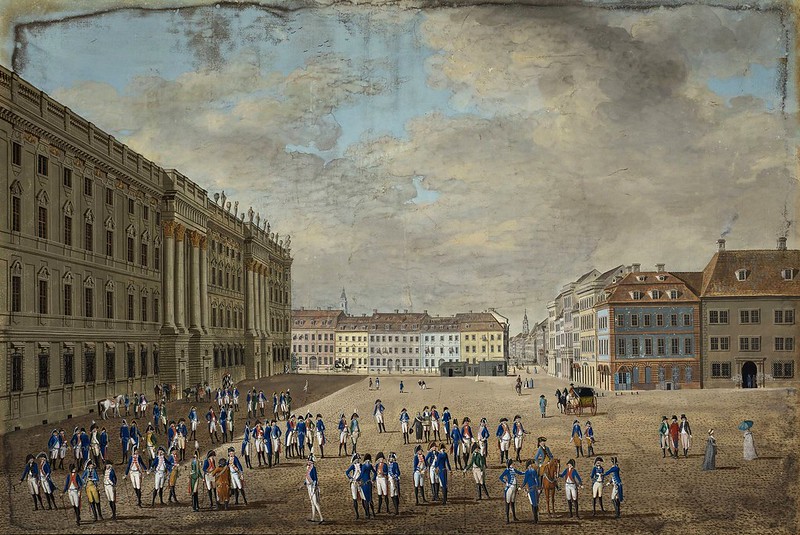Johannes Matthias Sperger (1750-1812)
- Sinfonie concertante à 3 voci (c.1785)
Performers: Klаus Trumpf (double-bass); Andrе Jonеt (flute); Hirofumi Fukаi (viola);
Kusаtsu Festival Orchestra
Painting: August Neigelsohn (fl. 1799-1807) - Officers of the Prussian Army in the Schloszplatz (1799)
Further info: Johannes Matthias Sperger (1750-1812) - Symphonies
---
German double bass player and composer. He apparently received his
earliest musical training from the Feldsberg organist Franz Anton
Becker. Several copies in Sperger's hand of theoretical works survive,
and contrapuntal exercises in the Schwerin Wissenschaftliche
Allgemeinbibliothek testify to his studies under Albrechtsberger in
Vienna. He is said to have made his début as a composer there at the age
of 18, and a symphony and a double bass concerto of his were performed
by the Tonkünstler-Societät in 1778. As one of the leading double bass
players of the day, Sperger saw service in several important court
musical establishments, first in that of Cardinal von Batthyani at
Pressburg (1777-83), then (1783-86) with the Counts von Erdődy at
Fidisch, Burgenland. A supposed period in the service of Prince
Esterhazy under Haydn is not documented. Following the death of Count
Ladislav Erdődy, Sperger returned to Vienna, but apparently without
employment, and he had to make a living as a copyist. In the search for a
position Sperger undertook several extended journeys (between December
1787 and June 1788 he went to Prague, Berlin, Ludwigslust, Ansbach and
Passau, and from March to June 1789 to Parma, Trieste and Bologna). In
July 1789 he took up an appointment to the Duke of Mecklenburg at
Ludwigslust, where he remained for the rest of his life, though he made
several journeys and guest appearances as a player and composer in
Lübeck, Berlin, Leipzig and Vienna. An important biographical source is
Sperger's Catalog über verschückte Musicalien (D-SWl Mus.3065),
containing details of many of his major compositions – many of them sent
to members of the nobility from whom he sought employment. Sperger's
reputation as a leading double bass player is generously acknowledged by
critical writing of the time; his achievements as an executant were
generally accorded more significance than his prolific output as a
composer. The obituary notice in the Allgemeine musikalische Zeitung
(xiv, 1812, col.432) is typical:
"The orchestra loses in him one of its most distinguished members in
that he displayed a rare mastery and purpose on his instrument, knowing
how to impart character to the performance as a whole. Apart from these
distinctions as an outstanding ripienist, Sperger also performed
concertos on the double bass, composed by himself, as well as a number
of symphonies, all of which, being in an attractive style and imposing
no burdens for their performance, should be suitable for amateur
concerts."
The Schwerin manuscripts of Sperger's symphonies and parthias often
reveal exceptional skill and delight in instrumentation, especially in
the extensive use of obbligato and concertante soloists and of groups of
wind instruments. In this respect several of the symphonies may be said
to belong to the popular sinfonia concertante literature of the period.
His concertos for double bass were both innovatory and technically
demanding for the soloist. Sperger's authority was felt for several
generations after his death, influencing particularly Capuzzi and
Dragonetti.

Cap comentari:
Publica un comentari a l'entrada